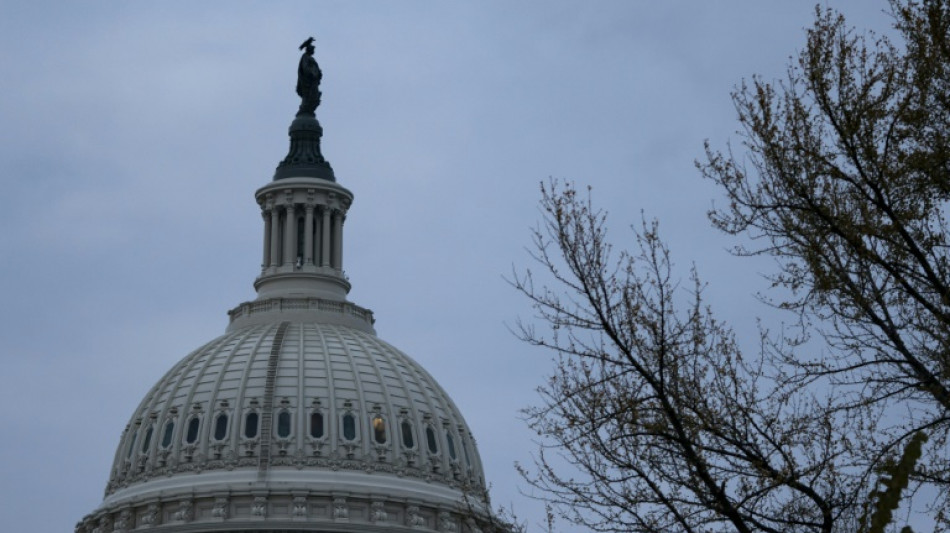

Wall Street rebounds despite US inflation ticking higher
Wall Street stocks bounced higher Friday despite data showing an uptick in inflation and a looming US government shutdown.
Data showed the personal consumption expenditures (PCE) price index rose 2.4 percent in the 12 months to November, up from 2.3 percent in October, the Commerce Department said in a statement.
The core reading of PCE price index -- the Federal Reserve's preferred inflation measure -- that excludes highly volatile food and energy prices stayed steady at 2.8 percent.
Wall Street's main stock indices initially fell on the news, continuing a spiral lower after the Federal Reserve on Wednesday signalled fewer cuts than had been expected for 2025 as inflation remains sticky above its two percent target.
However they bounced higher during morning trading.
While the annual inflation measures ticked higher, they dropped month-on-month, providing some relief to investors.
Core prices rose just 0.1 percent from October, compared to monthly increases of 0.2 or 0.3 percent the previous five months, pointing to a slight slowdown in what is sure to be welcome news for the US central bank.
New York Fed President John Williams, a voting member of the Fed committee which sets rates, told CNBC that the data shows "the disinflation process is continuing" and that it offers "a little bit of good news this month".
Jochen Stanzl, Chief Market Analyst at CMC Markets, also called the data "good news," say it will lead to a moderation in the increase in the PCE price index over a longer term.
"Today's PCE data serves as quite a reprieve after this week's sell-off," he said.
Investors were keeping a watch also on developments in Washington.
The House of Representatives has rejected a Republican-led funding bill to avert a government shutdown, with federal agencies due to run out of cash Friday night and cease operations from this weekend.
The legislation would have kept the government open through March and suspended the borrowing limit for president-elect Donald Trump's first two years in office.
O'Hare noted US Treasury yields fell overnight, "driven by some safe-haven trading that stemmed from the ongoing weakness in the stock market and heightened political uncertainty" following the rejection of the government funding bill.
Friday's Wall Street rebound could also be driven by it being a so-called triple witching day when stock, index and index futures contracts expire. With more than $6 trillion in options estimated to expire, trading could prove volatile.
European stocks finished the day lower although they cut their losses as Wall Street rebounded, with data showing tepid retail sales in the UK in the runup to Christmas dampening sentiment.
Oil prices, which have also fallen since the Fed's Wednesday announcement, continued their slide lower.
- Key figures around 1630 GMT -
New York - Dow: UP 1.4 percent at 42,947.20 points
New York - S&P 500: UP 1.4 percent at 5,948.04
New York - Nasdaq Composite: UP 1.4 percent at 19,634.69
London - FTSE 100: DOWN 0.3 percent at 8,084.61 (close)
Paris - CAC 40: DOWN 0.3 percent at 7,274.48 (close)
Frankfurt - DAX: DOWN 0.3 percent at 19,916.56 (close)
Tokyo - Nikkei 225: DOWN 0.3 percent at 38,701.90 (close)
Hong Kong - Hang Seng Index: DOWN 0.2 percent at 19,720.70 (close)
Shanghai - Composite: DOWN 0.1 percent at 3,368.07 (close)
Euro/dollar: UP at $1.0414 from $1.0364 on Thursday
Pound/dollar: UP at $1.2576 from $1.2496
Dollar/yen: DOWN at 156.32 yen from 157.35 yen
Euro/pound: DOWN at 82.83 pence from 82.91 pence
West Texas Intermediate: DOWN 0.1 percent at $69.32 per barrel
Brent North Sea Crude: DOWN 0.1 percent at $72.81 per barrel
burs-rl/gv
F.Bauer--MP




